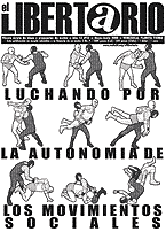Struggling for the autonomy of Venezuela’s social movements
El Libertario, Venezuela | 04.05.2008 17:56 | Analysis | Social Struggles | Workers' Movements | World

El Libertario # 53
Despite our opinion on nationalizing the company, the route that workers have taken at SIDOR, the main Venezuelan steelmaker, exemplifies the immediate task for the country’s social and popular movements to carry out: mobilizing ourselves and struggling for our own demands. For libertarian socialists, its is the militancy of all movements of the oppressed that encourages positive changes in society. Hoping that those improvements will flow down to us from the heights of power is a pipe dream, as reality over the last few years has shown. But two major straitjackets—polarization from above and the mortgaged autonomy of those of us below—have stifled the social movement actions.
Since 2001, El Libertario has denounced the hypocrisy of the polarization induced by leaders fighting for power. Both falsely opposed concepts come from the same source: a government based on oil profits, thereby involved in economic globalization, with maximum possible control over society and minimum real political space for popular movements. The imposed Manicheanism managed to legitimate the "leadership" and destroy the militant grassroots social fabric demonstrated during the 90´s, infantilizing thought and obscuring the structural cause of the political crisis—one of the continent’s most unjust distributions of wealth—a situation that has been mostly maintained. To side with one of these gangs, our grassroots movements applied their own Manichean rationalization and moved their own political agendas to a back burner in order to carry out the instructions of those in power and put their energy into electoralism.
In this context, we believe it’s significant that a group of workers took back up their duties as unionists, despite their political preferences, and mobilized themselves come hell or high water. In breaking with the false consensus, the Sidoristas’ struggle confronted the traditional response of Venezuelan governments, including the present one: state repression and solidarity with the bosses. When faced with the beatings and imprisonment of workers, the “Bolivarist” and “opposition” union leaders forgot about fundamental class-solidarity principles. Their silence was deafening. The polarization of labour federations is a bitter reminder of the consequences of substituting the electoral and media agenda for that of the social and workers’ movements.
However, the absence of real support before the repression the Sidoristas experienced demonstrated the deep crisis of the country’s workers’ movement and its inability to establish the ties of horizontal solidarity, a common identity different from both “Chavism” and the “opposition” and a shared goal—the conquest here and now of improved working conditions. This shortcoming is especially incisive when a rhetorically "revolutionary" government has put forward clearly anti-worker policies: restricting union freedoms, loosening working condition requirements via its puppet “cooperative,” preferring an economy based on the exportation of cheap energy on the world market and annihilating the sources of traditional jobs from the country’s economy. On the other hand, unions denounced the fact that, by 2007, 243 public sector collective-bargaining agreements were concluded without signature, which says plenty about the impact of “Bolivarist" unionism on working conditions in a State calling itself "revolutionary." And as if that weren’t enough, Venezuela has become the second most dangerous country (after Colombia) for union activity. Fifty-three people died last year in fights associated with obtaining petroleum and construction jobs. Labour organization gangsterism and decay, a catalyst for “Bolivarist” bourgeois preaching, alone has taken the lives of six workers already by March this year. Those who say they represent the working masses are silent about this situation.
For the oppressed, there are no substantial differences between oppressors. Another May Day is here, and all of us workers must struggle right now to wrench our rights from the bosses. Let’s take up our own battle flags and not give in for anything, not the elections of fair-weather friends or the promises of demagogue leaders with clay feet. Let’s reject their simplistic thinking, demobilize the polarization and recover the autonomy of our movements. One hopeful lesson of solidarity sums it up best: The people, united, advance without a party!
www.nodo50.org/ellibertario -
 ellibertario@nodo50.org
ellibertario@nodo50.org Translated by SonofTomJoad (
 http://sonoftomjoad.blogspot.com/)
http://sonoftomjoad.blogspot.com/)
El Libertario, Venezuela
 e-mail:
ellibertario@nodo50.org
e-mail:
ellibertario@nodo50.org